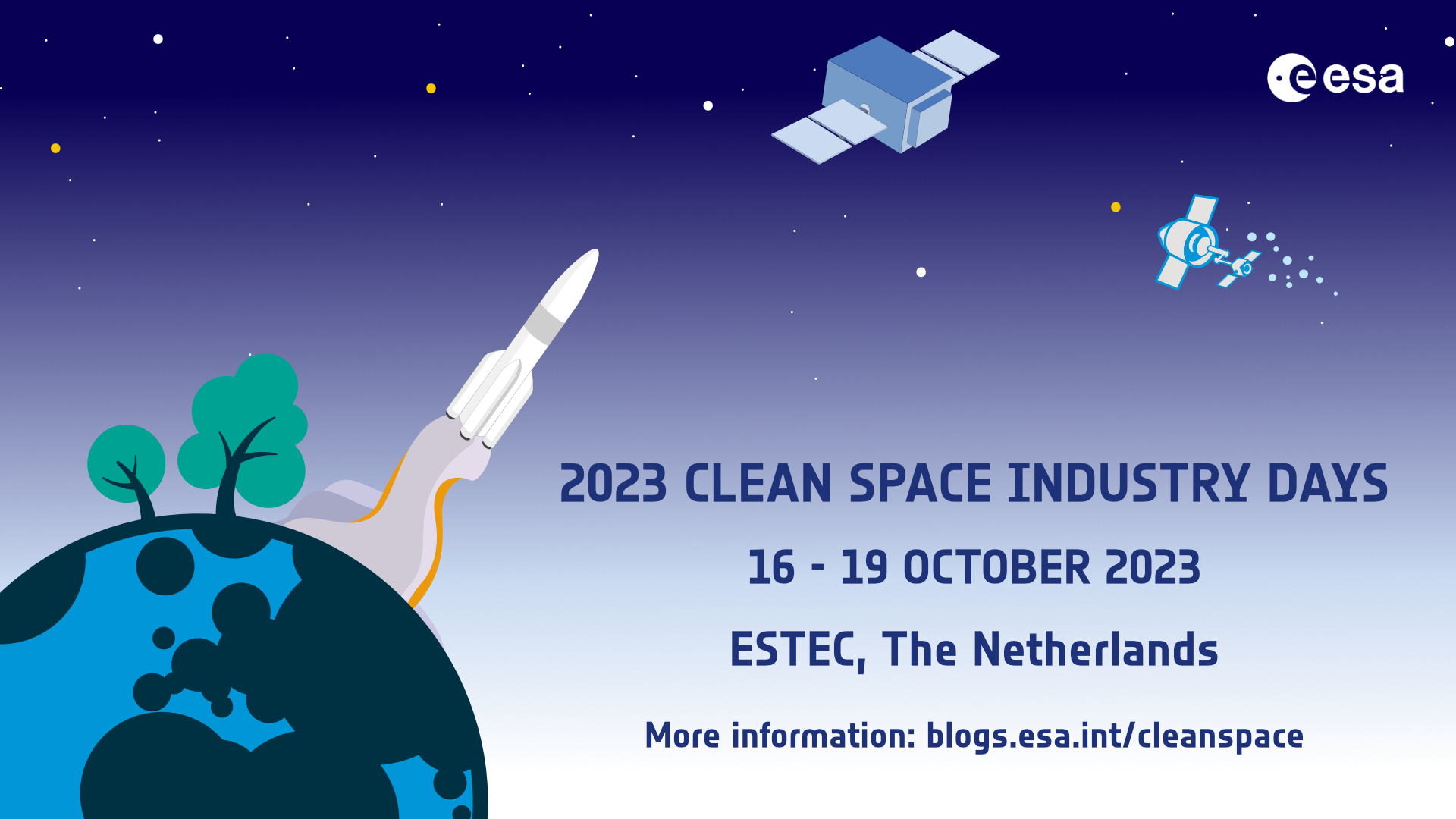The European Space Agency (ESA) is organising the 2023 Clean Space Industry Days. The event will take place from 16th to 20th October 2023 at ESTEC, The Netherlands.

The Clean Space Industry Days (CSID) 2023 is a must-attend event for all space professionals and enthusiasts working on designing and building sustainable space missions!
The five-day event will focus on the progress made in the fields of
- eco-design for space,
- end-of-life management,
- active debris removal and in-orbit servicing
Furthermore, the CSID will explore ways to consolidate the ESA Zero Debris approach.
ESA Zero Debris approach
The ESA Zero Debris approach was put forward at the ESA Council at the Ministerial level in 2022 and received great support from Member States. The new goal forms a key element to succeed in the implementation of ESA’s Agenda 2025 and the new PROTECT accelerator – working towards timely and accurate warnings of threats alongside measures to deal with them. The Zero Debris Approach expands ESA’s efforts within the Space Safety Programme and its related Clean Space initiative. Both are managed at ESA’s Directorate of Operations and aim at protecting life and infrastructure on Earth and in orbit.
Zero Debris outlines a series of actions and initiatives aimed at helping ESA in taking a strategic and proactive approach to safeguarding our space environment for future generations. The world leading Zero Debris approach will not only help to protect the functioning of satellites and the safety of human life on Earth, but also ensure that the benefits of space activities are enjoyed by all nations for many years to come.
The Zero Debris approach relies on the work performed in the frame of End-of-life Management and ADRIOS (Active Debris Removal and In-Orbit Servicing). Therefore, both clean space branches will be covered during the event, and an overview of the Zero Debris approach will be presented. Workshops will also be organised to allow the participants to give feedback to ESA on how to further implement and consolidate the approach.
End-of-life management
ESA’s clean space initiative has been developing technologies to prevent the creation of future debris and has been implementing system activities to promote their integration in future missions, thus feeding the Zero Debris approach.
The event will give the opportunity to present and discuss the latest outcomes on the following fundamental topics to comply with and anticipate the current and future space debris mitigation requirements:
- technologies for Design for demise
- technologies for Design for Removal
- technologies for Passivation
- technologies for Deorbiting
Abstracts related to these topics will be much appreciated.
Active Debris Removal and In-Orbit Servicing
During the Clean Space Industry, ESA encourages abstracts across various topics in the frame of Active Debris Removal and In-Orbit Servicing
Active Debris Removal
ESA is working together with ClearSpace on the implementation of an active debris removal (ADR) mission, ClearSpace-1. This mission will remove an existing debris, the VESPA upper part, which has been on-orbit since 2013. During the Clean Space Industry Days there will be an update on this mission, together with other ADR and inspection missions under implementation and in preparation by both ESA and European industry.
Commercial In-Orbit Servicing
Globally significant progress has been made in both the technical and commercial validation of in-orbit servicing activities such as debris removal, AOCS takeover for life extension, asset relocation, refuelling and in-orbit inspection. Looking forward, ESA aims to contribute to the creation of the demand for In-Orbit Servicing (IOS) in Europe by fostering both the service-offering side and to stimulate and enable the demand side of the developing IOS market. Recent IOS related activities conducted under ESA contracts highlighted the strong interest from commercial operators for life extension through Attitude and Orbit Control System (AOCS) takeover in Geostationary (GEO) orbit. At the Council Meeting at Ministerial Level in November 2022 (CM22), States participating to the Space Safety Programme (S2P) demonstrated strong support and ambitions for commercial In-Orbit Servicing (IOS). During the Clean Space Industry Days, ESA will present the latest regarding In-Orbit Servicing Mission Developments involving both service providers and commercial customers of IOS applications and welcomes abstracts in this area.
Circular Economy
In the long-term, IOS should enable the concept of a circular economy, with services such as in-orbit assembling, refueling, manufacturing and recycling and, even in space manufacturing and recycling. Therefore, abstracts related to circular economy in space will be also welcome, on top of in-orbit services and debris removal related matters.
Technology Development
Preparation is key for future In-Orbit Servicing Missions, in particular the derisking activities performed in technology developments. Abstracts on the latest state-of-the-art for GNC, capture systems, propulsion systems and avionics relevant for ADR and IOS are encouraged.
Close Proximity Operations
Increasing worldwide interest in the execution of rendezvous, proximity and capture operations for in-orbit servicing such as repair, refuelling, and tugging has highlighted the lack of clear and widely accepted technical and safety standards for uncrewed vehicles. There will be a dedicated session to cover standards and guidelines that enable commercial in-orbit servicing which are fundamental for building a common understanding between Agencies, insurers, integrators, equipment providers and licensing authorities.
Eco-design for space
ESA Director General reiterated in the Agenda 2025 that making ESA “a greener organisation” is a priority. This entails developing cleaner space missions and thus requires assessing and understanding their environmental footprint from the design phase to their end-of-life. A comprehensive understanding of the environmental footprint of space missions is paramount in order to:
- foster the application of ecodesign practices from early phases,
- comply with the expectations of European citizens in terms of environmental management,
- mitigate the risks of supply chain disruption from the early stages of the design because of stringent environmental regulations,
- prepare industry and decision makers for future challenges while remaining competitive,
- prepare roadmaps to develop greener technologies which can reduce the impacts of space missions
ESA Clean Space office has been working for more than a decade to achieve that goals and will take advantage of the 2023 CSID edition to further share the knowledge acquired, the latest developments and achievements as well as the challenges encountered. The clean space team is expecting the same from the professionals joining the event and is looking forward discussing any ways forward to enforce the European space sector’s position towards a greener space.
Abstracts related to the above listed topics are welcome.
Registration
Participation is free of charge. However, a registration is required. If you wish to attend the event, please register here.
Call for abstract
Submit your abstract for the CSID2023 here. If your abstract is selected, we will only ask you to give a presentation during the clean space industry days 2023 (no paper needed).
Please note the following deadlines:
- 10 September 2023: Abstract submission deadline has been extended!
- 18 September 2023: Announcement of the abstracts selected
- 8 October 2023: Registration deadline
- 16-19 October 2023: Presentations at CSID2023

